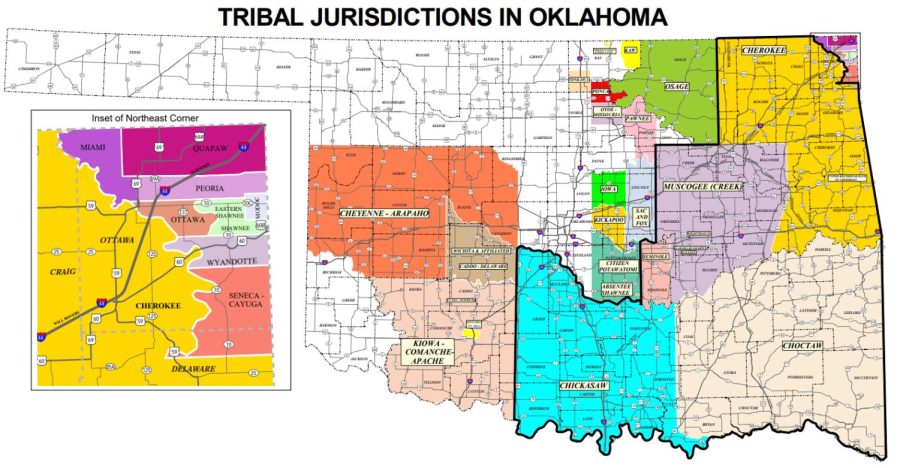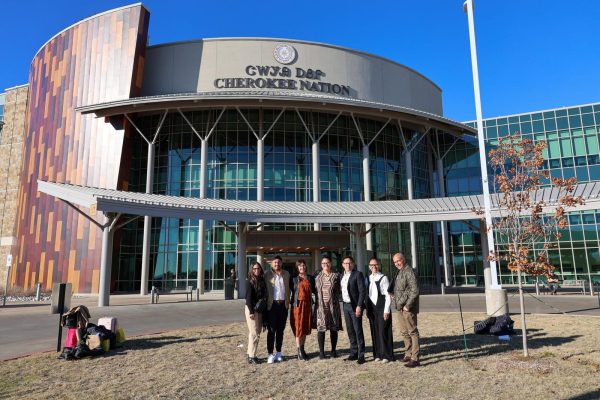Oklahoma tribes strike back at critics ahead of Supreme Court arguments
Native American reservations have helped to define Oklahoma. (Courtesy of Oklahoma Department of Transportation)
WASHINGTON – Oklahoma’s Five Tribes pushed back against critics of tribal sovereignty last week as the U.S. Supreme Court prepared to hear oral arguments Wednesday in a case that could solidify the impact of a decision recreating reservations in nearly half the state.
Those reservations are shaping up to be a significant issue in Oklahoma’s June 28 Republican primary.
John Bennett, chairman of the state’s Republican Party and a candidate for the 2nd Congressional seat being vacated by U.S. Rep. Markwayne Mullin, staked out the conservative end of the spectrum when he told the Washington Examiner last week it would be his priority to overturn the two-year-old McGirt v Oklahoma ruling if he were elected. He suggested that Congress should “disestablish the Muscogee Nation reservation.”
The Muscogee Nation has been at the heart of the McGirt controversy since the court ruled that Congress had never disestablished the Muskogee Reservation, a ruling that was quickly extended by Oklahoma courts to the remaining Five Tribes and to the Quapaw reservation.
The Inter-Tribal Council of the Five Civilized Tribes – Muscogee, Cherokee, Chickasaw, Choctaw and Seminole – quickly pushed back at Bennett’s stance.
“Oklahoma is strongest when our tribes are at the table. Candidates who seek to restrict our rights and disestablish our reservations, after the U.S. Supreme Court reaffirmed twice that they have always existed, do not deserve to represent our state,” the Five Tribes leaders said in a statement issued a day after Bennett’s remarks.
On Friday, the Muscogee Nation made clear where it was ready to fight any effort to curtail its sovereignty.
“The Muscogee (Creek) Nation will continue to fight in every venue – from the courts to Congress – to preserve its sovereignty and pursue justice for victims of crimes,” the nation said in a statement.
The 2020 McGirt v. Oklahoma ruling determined that 3 million acres in easten Oklahoma belonged to a Muscogee reservation established in the 19th century. The decision stripped the state of jurisdiction to prosecute major crimes committed by members of the Muscogee Nation.
The state has filed more than 30 petitions, 29 of which were dismissed, seeking to overturn the McGirt decision, including the 2021 Oklahoma v. Castro-Huerta.
Victor Manuel Castro-Huerta was convicted of neglecting his stepdaughter in 2015 in a Tulsa County district court. The stepdaughter is a member of the Eastern Band of Cherokee Indians, but Castro-Huerta is not. The Oklahoma Court of Criminal Appeals vacated his conviction and 35-year sentence under the McGirt ruling because the crime involved a Native American and occurred in Indian Country. The Supreme Court agreed to review the Oklahoma v. Castro-Huerta case to examine the scope of the previous verdict, but not to reverse McGirt.
Oklahoma Gov. Kevin Stitt “applauded” in January the SCOTUS’ decision to review the case, calling the McGirt decision “destructive.” Stitt said in a statement that McGirt has “hamstrung law enforcement in half of the state.”
“Criminals have used this decision to commit crimes without punishment. Victims of crime, especially Native victims, have suffered by being forced to relive their worst nightmare in a second trial or having justice elude them completely,” Stitt said, “I will not stop fighting to ensure we have one set of rules to guarantee justice and equal protection under the law for all citizens.”
The governor has routinely criticized the McGirt ruling on multiple platforms. Stitt’s pinned tweet on Twitter claims McGirt has “ripped Oklahoma apart” and features a clip from his March 30 appearance on Fox News to discuss the ruling.
The state’s brief to the SCOTUS argues in favor of the state’s authority, suggesting that without the federal overreach, Oklahoma has the authority to prosecute in cases such as Castro-Huerta.
“Absent Federal Preemption, A State Has Authority To Prosecute Non-Indians For Crimes Committed In Indian Country,” the brief reads.
Oklahoma tribes have expressed frustration with the state’s approach and have unified ahead of the upcoming hearing. The Five Tribes joined to file an amicus brief on April 4. Amicus briefs provide additional data to Supreme Court justices in complex cases and can be filed by parties who have expertise related to the case.
The brief detailed the tribes’ frustration with the state’s “attack” on tribal interests but reemphasized the nations’ willingness to cooperate in implementing McGirt fully.
“The State badly misses the mark when it argues that the Nations lack a significant interest in the outcome of this case,” the brief reads, “Despite the State’s steadfast resistance, the Nations and United States are effectuating that allocation through increased resources and intergovernmental collaboration in which the Nations are crucial links.”
Since the McGirt ruling, the Oklahoma Court of Criminal Appeals determined that eastern reservations of the Cherokee, Chickasaw, Choctaw, Quapaw and Seminole nations were also never disestablished, continuing to grant the tribes authority over their lands’ criminal justice rather than the state.
Cherokee Nation Principal Chief Chuck Hoskin Jr. and Cherokee Nation Attorney General Sara Hill plan to provide a virtual press briefing Monday to discuss the upcoming oral arguments. Both will be in attendance at the Supreme Court when the hearing begins.
Gaylord News is a reporting project of the University of Oklahoma Gaylord College of Journalism and Mass Communication.






